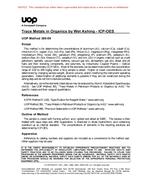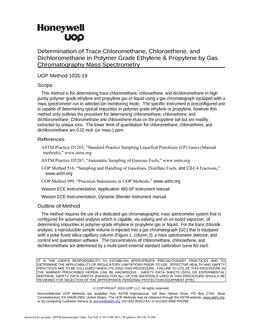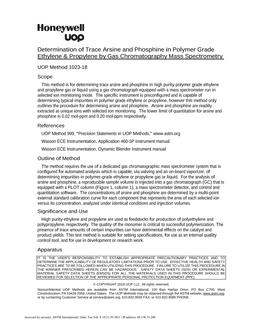
UOP 389-09
- Comments Off on UOP 389-09
- UOP
This method is for determining the concentrations of aluminum (Al), calcium (Ca), cobalt (Co), chromium (Cr), copper (Cu), iron (Fe), lead (Pb), lithium (Li), magnesium (Mg), manganese (Mn), molybdenum (Mo), nickel (Ni), palladium (Pd), phosphorus (P), platinum (Pt), potassium (K), sodium (Na), tin (Sn), titanium (Ti), vanadium (V), and zinc (Zn) in organic matrices such as crude petroleum, asphalts, vacuum tower bottoms, vacuum gas oils, atmospheric gas oils, diesel and jet fuels and their blending components, and polymers, by Inductively Coupled Plasma – Optical Emission Spectrometry (ICP-OES). Most of the elements can be determined within the concentration range of 0.02 to 200 mg/kg when a 50-g sample is ashed. Higher or lower concentrations can be determined by changing sample weight, dilution volume, and/or modifying the instrument operating parameters. Determination of additional elements is possible if they are not volatilized during the ashing step and do not form insoluble sulfates.
Alternatively, some the elements listed above may be analyzed by Atomic Absorption Spectroscopy (AAS). See UOP Method 391, “Trace Metals in Petroleum Products or Organics by AAS,” for specific metals and their range of quantitation.
Product Details
- Published:
- 04/01/2009
- Number of Pages:
- 9
- File Size:
- 1 file , 110 KB



